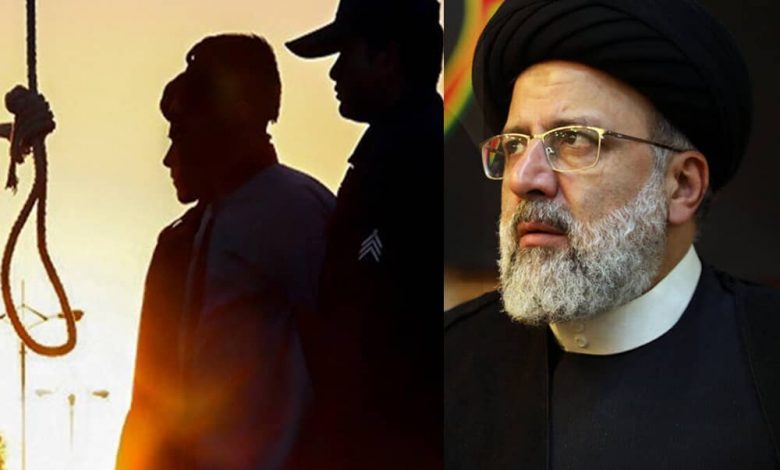Surge of Executions in Iran Foretell More Human Rights Violations

Written by
Shahriar Kia
On Sunday, August 8, three days after Ebrahim Raisi was inaugurated as the regime’s new president, the clerical regime out nine executions at three prison facilities. Another hanging on Monday brought the total to at least 22 for the month of August, and more than 200 since the beginning of the year. Forty-eight death sentences have been implemented in July, during which time three human rights attorneys were accused of spreading propaganda and plotting to overthrow the ruling system, then handed multi-year prison sentences.
Both of the Iranian judiciary’s actions represent longstanding trends in Iran under the mullahs’ regime which is widely recognized for its highest rate of executions per capita. Tehran routinely rebuffs international criticism of these numbers as well as its overall human rights record, often levying irrelevant accusations against “global arrogance” in an effort to distract attention from the regime’s open reliance on capital punishment in cases that clearly do not meet international standards.
At times, the regime’s judiciary has delayed the implementation of death sentences or even publicly vowed to re-examine politically motivated cases under intense international pressure. But in almost every case, the regime proceeds with the pre-determined punishment soon after the outcry has died down.
This was the case, for instance, during the latest wave of executions, when the regime carried out the hanging of Sajad Sanjari in accordance with his 2012 alleged murder conviction. At the time of his arrest, Sanjari was only 15 years old, making his capital sentence a very clear violation of international law.
Who is Ebrahim Raisi, a candidate in Iran presidential election and an executioner in 1988 massacre
In this way, Sanjari’s case was reminiscent of that of Reyaneh Jabbari, a young woman who was infamously hanged in 2014 for fatally stabbing her would-be rapist, whose affiliation with the regime’s Intelligence Ministry guaranteed that she would not receive a fair trial. Sanjari was originally scheduled to be executed in 2017, but as happened multiple times with Jabbari, the hanging was delayed indefinitely in the face of international outcry.
But Tehran has dismissed similar statements on many occasions over the years, with the regime’s own so-called human rights monitor arguing that the regime’s judiciary is not obliged to adhere to international human rights principles if they are at odds with the country’s own laws or the regime’s ultra-hardline interpretation of Shiite Islam. During the year 2020, at least five other executions of juvenile offenders were carried out, and it is possible that others went unreported on account of the regime’s penchant for secrecy.
Of the more than 200 executions known to have been carried out in Iran so far this year, only five of them were actually announced via the regime’s extensive state media apparatus. All others were brought to the awareness of human rights defenders by independent media outlets and local Iranian activists. Many of those activists have also pointed to the apparently ongoing acceleration in the pace of executions and concluded that it is a sign of the emerging influence of the regime’s new president.
Ebrahim Raisi was selected to that position on June 18 following by Supreme Leader Ali Khamenei, the ultimate authority in the regime. But the vast majority of the population boycotted the sham election in protest over Raisi’s more than 30-year history of severe human rights abuses. In the summer of 1988, he became a major figure in the Tehran “death commission” that oversaw a massacre of approximately 30,000 political prisoners. In late 2019 and early 2020, as judiciary chief, Raisi also played a leading role in a crackdown on nationwide protests, which saw 1,500 individuals killed in a matter of days and thousands of others tortured over a period of months.
Iran Election 2021: Empty Polling Stations Across the Country (Compilation vol.1)
Raisi’s time as the nation’s top law enforcement official also saw the beginning of the broader trends which are continuing with the current surge of executions. As well as implementing death sentences more quickly than in the preceding years, Raisi’s judiciary broadened the application of capital sentences, effectively reversing earlier reforms to the country’s sentencing guidelines for non-violent drug crimes and issuing the first death sentence in years for someone accused only of consuming alcohol.
Of course, in light of Raisi’s legacy of human rights violations, the greatest concerns surrounding his promotion are related to the suppression of dissent and the violent punishment of persons affiliated with opposition groups like the People’s Mojahedin Organization of Iran. That organization was the prime target of the 1988 massacre, having been directly named in the fatwa which the regime’s founder Ruhollah Khomeini used to set the stage for the killings.
Reflecting on his role in the 1988 massacre in recent years, Raisi has openly defended Khomeini’s declaration that the systematic execution of PMOI members is part of “God’s command.” Such statements demonstrate Raisi’s obvious expectation of impunity in such matters, while his appointment as president demonstrates a similar expectation on the part of Khamenei and the regime as a whole. In fact, Amnesty International condemned this very thing in a statement issued the day after Raisi’s election.
The human rights organization’s Secretary-General Agnès Callamard wrote: “That Ebrahim Raisi has risen to the presidency instead of being investigated for the crimes against humanity of murder, enforced disappearance, and torture is a grim reminder that impunity reigns supreme in Iran.”
Last week, that impunity was arguably reinforced by the European Union when it sent a leading foreign policy official to attend Raisi’s inauguration, thereby handing him undue legitimacy and downplaying his culpability for crimes against humanity.
As the National Council of Resistance of Iran recently stated: “It is time to refer the mullahs’ appalling human rights record of four decades of crime against humanity to the UN Security Council for the adoption of concrete and punitive measures.”

